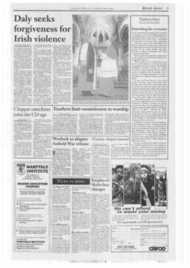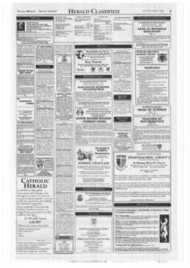Page 7, 27th January 1995
Page 7

Report an error
Noticed an error on this page?If you've noticed an error in this article please click here to report it.
Tags
Share
Related articles
When Malcolm Muggeridge, A Sceptical Western Writer Their...
Pride Before A Fall Rout Of The Admiral
Disaster! Our Christmas Crib Has Just Gone Up In Smoke
Mary Ward 1585-1645
Coping With A Diabetic Child's Problems
SALLY TRENCH LOOKS and sounds like a county horsewoman in
her mid40s. But look more closely, and you will see a face being consumed by the fire of a great love.
Five convent schools tried and failed to reduce her to normality; if anything, they made her worse, because they showed her the pure, unconditional love that permeates the Gospels, without any of the caveat') that most of us learn to apply. The result was that in 1965, when she was expelled from her last school, she embarked on the undignified vocation of loving the dossers at Waterloo Station. She would bicycle there secretly from her parents' house in St John's Wood, carrying hot coffee, blankets from her brother's bed and anything else that was needed, bought by selling her father's silver. When he objected to being Cast in the role of the father of St Francis of Assisi, she walked out and went to Waterloo Station.
The station was only the beginning. Sally also lived in squats, bomb sites and derelict buildings, with dossers, meths drinkers, and drug addicts. She was their friend. She dressed their sores, found them clothes, and fought the dogs in the gutters of Covent Garden for bruised fruit to feed them. When they were dying, she was there with them.
An elegant Jesuit made her publish her memoirs (written on lavatory rolls from the Ladies at Waterloo), and "Bury Me In My Boots" was one of the best-sellers of 1968: suddenly, everyone was feting the outcast saint
whom only yesterday they'd shunned because she smelt so Sally fled. She ended up in the slums of Harlem, where each morning the police would confiscate all the drugs on the street, selling them back at night to the desperate addicts. A ten-year-old boy called Jake avoided this cycle by hiding out with his heroin on the roofs of the tenements and Sally would keep him company. One day, a praise-the-Lord clergyman appeared on their roof, out to save his morning's quota of souls. He approached his preaching of God's love with such contempt for his poor black audience that Sally was about to knock him down; but Jake stopped her: "Don't hit him. Even the adequate deserve our understanding."
The clergyman survived. Jake died of an overdose a couple of years later, but he had changed Sally's life. Even someone so young, so apparently hopeless, without a shred of religious education, had enough of the divine spark in him to put her to shame. When Sally returned to England, she founded Project Spark in his memory. She determined to try and find that spark in even the most maladjusted and delinquent children, and fan it into flame so that they could take charge of their lives and not become the hopeless down-and-outs she had lived for on the streets of London.
It was absurd to suppose that one woman could make any difference when all the might of the State had not; hut this did not stop her. She moved into a large house in Hampstead and took on some teachers, and, over the years, more than 600 disruptive horrors passed through it. Most of them managed to return to full-time education and develop something of their full potential.
Absurdities such as Project Spark cannot be tolerated in a well-run educational system. When ILEA (which had somehow found room for this absurdity) was abolished, Spark was quietly strangled. Refounded in rural Oxfordshire as a residential institution for maladjusted but intelligent children, it was quickly squashed by the authorities, who simply sent violent drug-addicted morons there instead. Sally Trench was left with nothing but a vocation and a large house. It was at this point that the war in Bosnia broke out, so Sally went there at once.
At first sight, it would seem that the tragedy of Bosnia is that terrible, abnormal things happen there. It is not. The real tragedy, for the children at least, is that the terrible things that happen are normal : for how' can anything be abnormal if it is all you have ever known? The happy knifewielding five-year-olds will become happy Kalaslmikhov-wielding tenyear-olds; but when the war ends, they will be uneducated misfits. So, as well as bringing in supplies, Sally sets up schools where she can. If there are no clocks in the town, the church bell will call the children to school. If there are snipers about, slit trenches will protect pupils on the way to the dugout that are their classrooms.
Sally Trench is an anachronism. In an age in which we delegate compassion to the duly appointed authorities, which then dehumanise their "clients", Sally breaks the rules: she just goes out and does things. She has been threatened, assaulted, knifed, blown up, detained by the police and held at gunpoint by soldiers, and none of it has stopped her, because she cannot stop.
Doubtless the bureaucrats will have their way in the end (the passage through Austria or Croatia gets harder every time), but God will send Sally something else to do. He always does.
blog comments powered by Disqus











